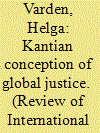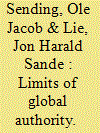| Srl | Item |
| 1 |
ID:
108475


|
|
|
|
|
| Publication |
2011.
|
| Summary/Abstract |
I start this article by addressing Kant's question why rightful interactions require both domestic public authorities (or states) and a global public authority? Of central importance are two issues: first, the identification of problems insoluble without public authorities, and second, why a domestic public monopoly on coercion can be rightfully established and maintained by coercive means while a global public monopoly on coercion cannot be established once and for all. In the second part of the article, I address the nature of the institutional structure of individual states and of the global authority. Crucial here, I argue, is Kant's distinction between private and public right. Private right concerns rightful relations between individual legal subjects, where public right concerns legal subjects' claims on their public institutions. I propose that the distinction between private and public right should be central to liberal critiques of current legal and political developments in the global sphere.
|
|
|
|
|
|
|
|
|
|
|
|
|
|
|
|
| 2 |
ID:
142240


|
|
|
|
|
| Summary/Abstract |
Global benchmarks (re)shape political conversations and institutionalise authoritative languages. It does not necessarily follow, however, that benchmarks can exert a lasting or significant influence over policies and behaviour of benchmarked actors. We analyse how the World Bank uses benchmarks to manage its relations with both donors and recipient governments. We analyse the role of the World Bank’s Country Policy and Institutional Assessment (CPIA), both at headquarters and in relation to the recent history of two countries in Africa: Ethiopia and Malawi. We find that the CPIA is not – and contrary to what one would expect from the CPIA’s nominal function and the literature on benchmarks – a very important tool for signalling incentives and allocating funds, or shaping the policy dialogue or the World Bank’s strategy in these two countries. Rather, the CPIA is used highly selectively as one factor among many in the negotiations between World Bank staff and governments. We conclude that the CPIA helps establish the World Bank as an actor that embodies global authority on development issues, including with donors, but that there is a tension between such global authority on the one hand, and concrete authority to shape policy in domestic contexts, on the other.
|
|
|
|
|
|
|
|
|
|
|
|
|
|
|
|